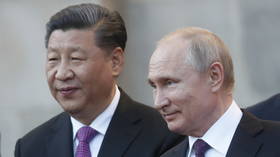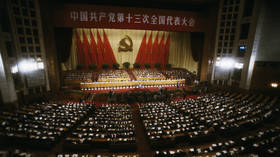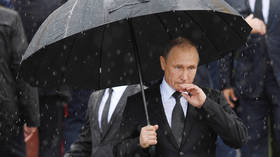Timofey Bordachev: Here's why the emergence of China as a global power is in Russia’s interests

A more balanced world order is in Russia’s interests, and the only country with the heft to drive it is China. This is fully understood in Moscow.
China's current position in Russia's foreign policy interests is determined by two factors. First, due to its geopolitical position, relative lack of resources and its foreign trade structure, Beijing cannot be regarded as a potential challenge to Moscow – even in the long term.
Second, China is Russia’s objective ally in attempting to dismantle the neo-colonial system built by Western countries – led by the US – after the Cold War, which ensures their privileged position in world affairs. This means that a de facto alliance between Moscow and Beijing is now the most justifiable strategy. This is not only about survival, but also relates to the need to address areas where Russia needs to develop and strengthen its position in the international arena.
The rapprochement between China and Russia is due to a variety of reasons. The political leadership in Beijing supports Moscow quite sincerely – this is confirmed by examples of cooperation in the new environment.
We should not expect major Chinese companies to expose themselves to US sanctions in order to support Russia. But at the same time, we have no reason to fear that Beijing's basic approach to assessing Moscow’s actions inUkraine will change because of what is happening on the battlefield or because of American pressure or bribery.
Over the last 50 years China has become less dependent on good relations with the West: the process of opening markets for its goods and attracting investment and technology has been completed. Thus, the country’s further development and the consolidation of the Communist Party's power now requires a gradual severing of the ties formed since the mid-1970s and its independent entry onto the global stage as a source and distributor of wealth.
China's relations with the US are now antagonistic in nature, while there is no apparent reason for confrontation with Russia.
In geopolitical terms, China represents the most reliable 'rear' for the policy of restoring Moscow’s influence inparts of Eastern Europe, the Middle East, the Transcaucasus and Central Asia. Furthermore, Beijing is now the only alternative source of development funds outside of the West for the small and medium-sized states of Eurasia. This, however, presupposes the maintenance of a certain political order there, which could, of course, be destroyed by the US and countries in its orbit.
There is reason to believe that Chinese-Russian rapprochement was one of the factors that encouraged Washington to increasingly put a spoke in the wheel of Moscow's interests in Europe, which eventually resulted in the Ukraine crisis.
Furthermore, it should not be forgotten that the gradual strengthening of ties between Beijing, Moscow, and Berlin would have been a real geopolitical nightmare for Washington and London. However, this prospect – which was at one time possible – now seems very unlikely because of the position of Germany and the European Union vis-à-vis the US.
For China itself, the combination of its coastal and continental position also means the need to strengthen its rear in the face of constant threats to its maritime thoroughfares. Russia should not worry about the likelihood that China will be able to take over a large part of the world’s financial, transport, and logistics systems.
We can hardly expect significant changes in the structure of Russia’s foreign trade relations in the coming years. This means that China will not become its competitor in terms of access to the markets of other countries.
It’s also clear that exerting a decisive influence on international institutions is a tool by which powers shape a more favorable environment for themselves in the global economy and political system.
China is unlikely to be an exception, although there are some indications that its leadership will not be as authoritarian as that of the US. Also, Washington and its allies – despite their domestic problems – are unlikely to lose their position completely.
In other words, from Russia's point of view, an increased Chinese presence in international affairs creates the fundamental prerequisites for breaking the monopoly of the West, but it doesn’t pose the threat of a new unipolar center of the world’s economy and politics. Therefore, the Chinese factor now serves as a key argument in favor of forming a more balanced international order, which is fully in Russia’s interests.
This article was first published by Profile.ru














